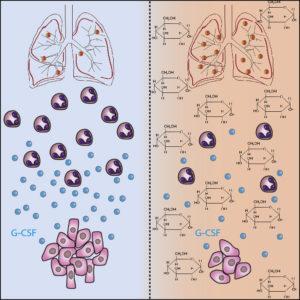Several studies have suggested that diabetes and hyperglycemia increases the risk of developing breast cancer and metastatic disease, as well as poorer prognosis of cancer in individuals who have these conditions. Metastasis is the spread of pathogenic agents from the primary infection site to secondary sites of infection. This process is of particular importance in cancer pathology, as metastatic seeding often results in secondary cancerous infection sites, leading to more severe cancer.
Fainsod-Levi et al., researchers from the Hebrew University Medical School, used mouse co-infection models of breast cancer and type-2 like diabetes, to study the impact of hyperglycemia on tumour growth, metastatic seeding and metastatic progression. Type 2-like diabetes was induced using low dose treatment of mice with streptozotocin (STZ), a chemical that preferentially kills insulin-producing pancreatic β cells resulting in hyperglycemia due to lack of insulin.
Fainsod-Levi et al. observed reduced tumour growth but increased metastasis of cancer to the lung in hyperglycemic mice. This effect was specifically due to increased glucose levels, as they observed a reduced risk of metastatic seeding when glucose levels were normalised. This illustrates a link between glucose levels and tumuor growth and metastasis.
Previous studies have shown a crucial role of neutrophils in limiting metastatic seeding of cancerous cells.Researchers observed no difference in neutrophil function between hyperglycemic and normal mice with cancer. Interestingly, they observed reduced levels of neutrophil mobilisation to the lung in hyperglycemic-cancer infected mice. This reduced level was attributed to low circulating levels of G-CSF. Thus, increased metastasis to the lung in hyperglycemic mice was due to reduced neutrophil numbers and not impairment of neutrophil function.
This study shows that hyperglycemic-induced changes in the tumour microenvironment prevents tumour growth but enhances metastatic seeding which can result in a more aggressive disease. Additionally, the study showed that proper management of blood glucose levels has the potential to prevent progression to aggressive cancer in diabetic patients.
Journal Article: Fainsod-Levi et al. 2017. Hyperglycemia Impairs Neutrophil Mobilization Leading to Enhanced Metastatic Seeding. Cell Reports.
Journal Article by Cheleka AM Mpande












